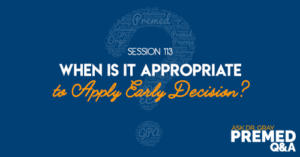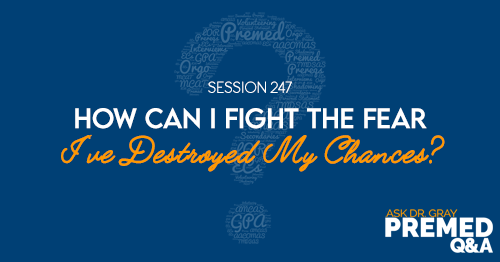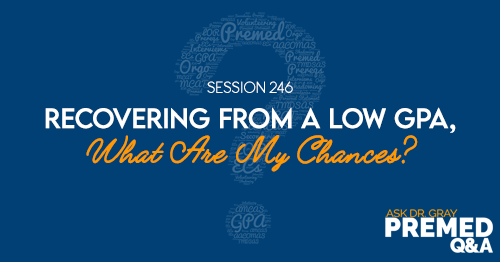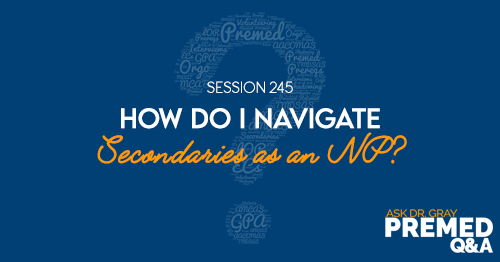Apple Podcasts | Google Podcasts
Session 113
You have strong ties to a medical school, but should you apply early decision? Today, we talk about how to show your dream med school they’re your #1 choice.
Listen to this podcast episode with the player above, or keep reading for the highlights and takeaway points.
By the way, the episodes in this podcast are recordings of our Facebook Live that we do at 3pm Eastern on most weekdays. Check out our Facebook page and like the page to be notified. Also, listen to our other podcasts on MedEd Media. If you have any questions, call me at 617-410-6747.
[00:27] Question of the Day
“I have a question regarding “significant ties, ” specifically how out-of-state applicants need to have significant ties to that state of the school you’re applying to. So what would be considered to be a significant tie to a particular school?
I was a scribe and a phlebotomist at a teaching hospital that I worked really closely with both graduates and physicians who taught at this particular medical school. So I had a very close relationship with them.
I also worked with an ultrasound clinic fellowship that was run in collaboration with the residency program and the medical school. I then volunteered to do research there for a year.
And now I’ve been a paid researcher there for a semester. So in that, using those connections, I’ve also been attending a lot of the online seminars they have for their medical students. And I feel really passionately that that’s where I want to go.
Not just because of all my great experiences working with their providers up until this point. But a lot of the doctors I work with directly within those opportunities were the ones that I said, I want to practice like this person. Or I want to have the skills like this person who was a graduate of that program.
So my question is, how do I accurately relay this connection on an application? And how do I make sure that if the plan doesn’t work out, and I don’t end up getting into the school, how do I not shoot myself in the foot by being too connected to one school that I get ignored by others?”
[02:37 Applying Early Decision
That’s always the challenge if you want to put all your eggs in one basket, how does that not “shoot yourself in the foot” for other schools. And that’s where the early decision application comes into play potentially.
A lot of students who have already been a part of a school in so many ways feel like it’s the one school they want to go to. So they’re going to apply early decision.
Our student says they have an early decision program. But listening to our podcast many times where we commonly advise not taking it, she’s trying to follow this advice. The student’s second concern is that the school she’s connected with has both an MD and DO program. She would be elated to do either one, but she can’t apply early decision for both.
So this narrows down the school choices for her since there are only a few schools in the country that have MD/DO programs.
For context, in terms of early decision, I’m definitely not a super fan of early decision for most students.
However, there are very specific reasons why a student would want to apply early decision. As long as those things make sense and the student is still a very strong applicant, go ahead and apply for an early decision. That’s also given that you know the risk of shooting yourself in the foot.
'A lot of students think early decision means they don't have to be as good of an applicant and they just really want to go to that school.'Click To Tweet[05:04] Defining Strong Ties
For instance, you are a resident of Michigan so you are “in-state” in Michigan, and then you apply to the University of Florida, which is an out-of-state public school.
“The mission of most public schools is to serve that state and to serve the residents of that state.”Click To TweetUnderstand that most public schools want to train students from their state to hopefully stay in the state and practice medicine in the future.
When you look at public schools interviewing out-of-state students, a lot of times, it’s because of the stats. They just want the highest stats possible to bump up their own stats. It’s an ego thing, unfortunately.
But a lot of schools will look at what are your ties. You could be in Michigan right now. But maybe you were raised in Florida and you went to high school in Florida. Then you went to Michigan for undergrad, and your family still lives in Florida. But you’re a Michigan resident now.
So here, you have very significant ties to Florida. And that is potentially enough to get you an interview, even if you don’t have the best stats because you have strong ties to Florida. Or you may be one of the students who isn’t a resident, but really wants to have their future in Florida. So that’s to recap the “strong ties” aspect of that.
Now, getting directly to our student’s question about how to let them know that they have strong ties to that one school. Then simply tell them how you’re a part of their community and you already love it.
Luckily, the far majority of schools usually have this question of “why do you want to come to this school” in their secondaries.
Our student says that Michigan State DO has this in their questions. While in their MD program, they do a system-by-system education program. So they specifically ask, why do you think that this sort of novel way of teaching would be a good fit for you?
[07:49] Asking for Letters of Recommendation
Usually, in the teaching hospitals where the physicians are working, it’s automatic that you are a professor of that institution. Because you’re at the teaching hospital, you’re training the medical students or residents at that institution.
And so outside of the normal kind of “everyone’s a professor,” I asked the student if any of her connections have stronger ties to the medical school and to the admissions world. She mentions that several of the doctors she has close ties with are professors there for the subspecialty that she worked directly with. Also, one of the doctors that she worked with did a lot of help hosting the medical students there.
She knows a couple of doctors who have done interviews for them. But she says she doesn’t want to put them in an awkward spot in case they got into a situation where they could be either interviewing her. I had to stop her right there because she was not putting them in an awkward spot.
“The process of the admissions is that if they came across your file, they would remove themselves from your case.”Click To TweetNow, that doesn’t mean that they can’t offer a potential letter of recommendation stating that they know this student. So I would 1,000% ask the people who you think have the closest ties to the admissions world at the school. Ask them for a letter of recommendation.
Don’t worry about any sort of conflict of interest because all of that is worked out on the back end. When they’re reviewing applications, people will remove themselves from a file review if they know the student. They would just say they know you so they’ve can’t offer an unbiased opinion.
[10:42] A Trick in the AMCAS World
'In the AMCAS, you can be a little bit more strategic with what letters of recommendation go to what school.'Click To TweetIf you think it may be a strong letter, you can have that person write two letters. One is specific to the institution they’re a part of and where you are a part of. And then the other one is generic that says you’re just a great student and that it would be great for any school to have you.
You just have to be very careful when you’re assigning letters to schools. Make sure the letter is specifically named so that you know that it’s very school-specific and it only goes to that one school.
[11:47] Physician Letters vs. Committee Letter
Q: “I sort of got too excited when I was asking for letters. I haven’t applied yet and I’m applying in May. But I have lined up five to six letters, and the school that I’m hoping to go to requires three and a maximum of five.
I have three physician letters that are all really valuable to me. One has become one of the directors of the department that I worked for. One was the leader of the fellowship program that I worked with for ultrasound, who was also in the department I worked for. And the third letter is a provider who knows me really well.
The first two are graduates of the school that I want to go to and work with students there. And so, it’s hard for me to choose between letters if I have to put a committee letter from my undergraduate institution in there as well. So would you say stick with the provider letters or let the committee letter go?”
A: My advice here is to look at the school’s specific requirements. Look at what the school requires and make sure you’re meeting those requirements. Then you can add the extra letters on top of that. Although I don’t always recommend it. But it sounds like the letters this student has are very specific, and hopefully, very strong, especially for that specific institution. So I would go ahead and try to max it out.
“Usually, schools require more than just physician letters.”Click To TweetOftentimes, committee letters still want letters of recommendation from other people. And then they just summarize and have their own internal language for how strong of an applicant you are compared to the other students in their cohort.
Now, this student describes that the school has a liberal process and they’re generous in the perspective that they let anybody choose. So if you want to go for the letter, they’ll let anybody do it as long as you get it in on time. And they will take into account input from your other professors. The medical school requires at least one science professor, and then one physician letter. Usually, committee letters automatically meet all the requirements for each of the schools.
“If you get a committee letter, you don't really need to look at what the requirements are for the individual institutions.”Click To Tweet[16:43] The Best Way to Convey Your Strong Ties
Your primary application is generic for any institution. When it comes to writing your personal statement, you’re not putting specific schools in your personal statement.
The one place where it will stand out is in your extracurricular descriptions and activities because your activities are going to be centered around that institution. It will come in the secondaries, which are very school-specific and then obviously, in your interviews.
Don’t make it specific to the institution in terms of description. You may fall into this trap of, “here’s everything I loved and this is why I love this community and why I want to be a part of this community.” Again, that’s getting too specific into the institution in your primary application.
Again, the primary application is super generic in terms of institutions. With the activities, obviously being located there, they’re going to get a sense of that.
“In terms of the activity descriptions, your goal is not institution-specific, but what was your impact, and what was the impact on you?”Click To Tweet[18:55] Long-Term Commitment to Activities
Q: “I’m nontraditional. I’ve been an undergrad now for almost eight years. I’ve been pretty consistent volunteering throughout all of those years. But I haven’t found “the one.” And I’m wondering if you think that it would be beneficial to wait to apply until after I have that one connection with a volunteer opportunity that has meaning?
Now, the student here is subjectively saying that schools are not going to like that. But they may turn around and think it’s really cool. She’s got lots of great experiences and has lots of interests. It doesn’t look like she spent a ton of time at one activity, but that’s okay. So they may not care about that at all.
'Stop looking at what everyone else is doing. You've done what you've done for the reasons you've done them.'Click To TweetThere are reasons if you don’t have one long-term commitment. If it comes up why you don’t have one long-term commitment, you don’t need to make excuses, just tell your story.
Our student admits there’s that voice of one of her premed advisors questioning why she’s moving around to a lot of different things. And that’s a problem with how advisors and students look at the activity section.
As a nontraditional student who has had eight years of undergraduate experience, you have time to explore your passions and explore everything that’s going on. And then with life events and other things, things throw you off your game. Then you go and find new opportunities. So all of that stuff happens.
The activity section doesn’t mean you’re proclaiming your love for one activity. In that case, then everyone would just have one activity because that’s what they’re passionate about so that’s all they’re doing.
'The activity section is to show who you are and what you've been doing over the course of your time.'Click To Tweet[24:39] Final Thoughts
At the end of the day, in your secondary application and during an interview, you can focus on the school’s core mission, vision, and values. Then explain how those relate to you and what your values are and what your mission is in life. There’s a synergy there.
But in terms of making sure you really hammer that home or stay away from it, just be honest and stick to who you are and what your values are. And if they do align great. Just make sure you mentioned that in the appropriate spots without cramming it down their face where it doesn’t belong.
Links:
Medical School HQ Facebook page
Medical School HQ YouTube channel
Instagram @MedicalSchoolHQ
SEARCH SITE
LISTEN FOR FREE












